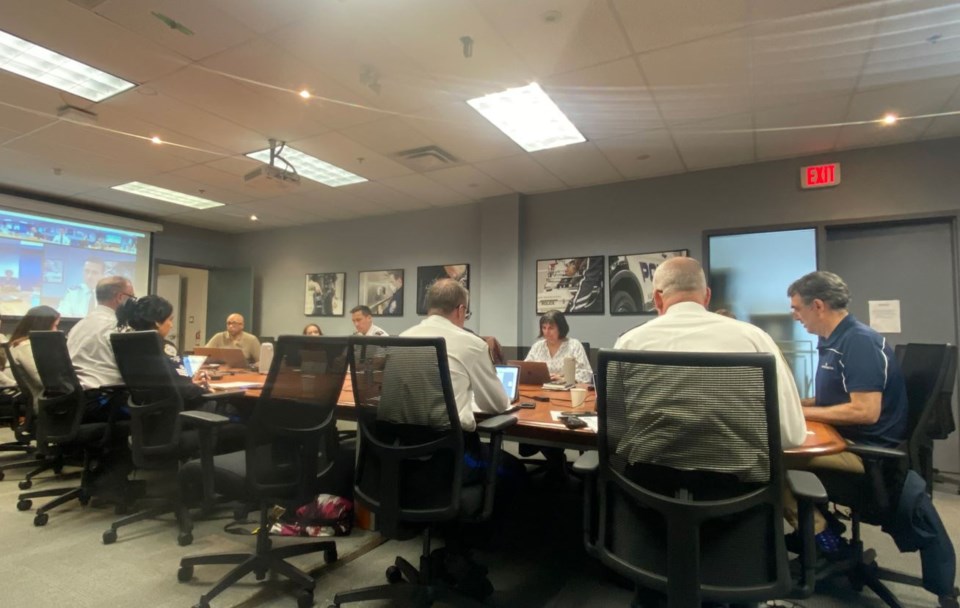New Westminster’s mayor has always chaired the local police board – but will that soon change?
The province has made amendments to the Police Act regarding police governance of police boards. Municipal councils must how determine who their representative on the police board and police boards can now elect their chair and vice-chair.
Mayor Patrick Johnstone is currently New Westminster city council’s representative to the police board, as the mayor has automatically served as chair. To date, the New Westminster police board has not had a vice-chair.
At Tuesday’s police board meeting, Johnstone said city council will selecting its representative to the police board at a public meeting in June.
“We are required as the city council to appoint a member to the board before the end of July,” he said. “And the police board is required to elect a chair from the membership before the end of July. So that's the timeline we're on.”
During a discussion about police board governance, member Mary Trentadue questioned if the board is likely to have new members at its July meeting.
“I can't answer that question; I don't know,” Johnstone said. “Whether the province makes an order in council and appoints the final member of the board is unclear. And what decision council makes about the council representatives is unclear at this time.”
Johnstone said the first item of business at the board’s meeting in July will be to elect a chair from its members.
The police board’s June 18 meeting agenda included a governance manual outlining the responsibilities of the chair, vice-chair and board members. After making a few changes to the document, the board approved the manual, as amended.
While the chair and vice-chair would be elected to a two-year term, the board added language that states a chair could be removed by a majority vote of the board’s members.
Board member Drew Hart joked the board may “make a bad call” and need to replace the chair.
Trentadue questioned one of the chair’s responsibilities, as outlined in the manual. It stated the chair would be “reviewing pre-meeting information packages for completeness, with the goal of providing board members with sufficient information to enable them to prepare for the meeting.”
“I was thinking about a worst-case scenario if a chair blocks reports that come to the board because they don't like them, or they don't think they're complete, or … whatever,” she said. “And so, I just wondered, in your current role, Patrick, do you review anything that comes before? Do you get the agenda package before the rest of us and review it and say, ‘Yes, it's OK?’”
Johnstone said the current practice is that he meets with the police chief to discuss agenda topics – not the reports themselves. He said they discuss whether items should be considered in the open meeting or closed session, and what parts of the agenda reports should be placed in, such as new business and consent agenda.
“We have a discussion about what fits where best on the agenda,” he said. “I don't read the reports ahead of time.”
Hearing that, Trentadue suggested the wording in the policy should be changed to “agenda” as opposed to “information package.”
“I don't really want a chair sanitizing or removing … any of those things. But I'm fine with the review of the agenda,” she said. “That's totally fair and within their purview.”
Police board honoraiums
The report also outlined the honorarium that board members receive for attending meetings. It stated that members of the police board, other than the mayor as chair, are eligible to receive an honorarium, which is “a token payment designed to express appreciation for voluntary hours and to cover out-of-pocket and incidental expenses (e.g. parking, transportation, printing costs, cell phone, telephone, and childcare) incurred by the member while carrying out their board duties.”
Effective Jan. 1, 2022, the following honorarium rates apply for board meetings: $273 per meeting of four hours or less and $548 per meeting of four to eight hours. If the board meets for more than eight hours consecutively, a further honorarium will be paid.
“As recognition of the significant additional responsibility and time commitment of the chair and vice-chair, including but not limited to coordinating board affairs with the chief constable, and acting as the board’s spokesperson, the chair is to receive an additional flat-rate per diem of $500 per month and the vice-chair an additional flat-rate per diem of $250 per month,” said the policy.
Police board members are also eligible for an honorarium of $150 for attending annual meetings and summits hosted by Canadian and B.C. police board associations, as well as a $100 honorarium for board members’ travel (outside the Lower Mainland or Vancouver Island) before or after these meetings.



